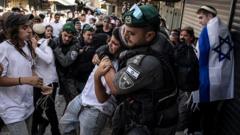Far-right activists’ aggressive demonstrations during Jerusalem Day spark national and international outrage as clashes erupt in the city's Old City, further intensifying the already volatile regional situation.
Far-Right Marchers Clash with Palestinians Amid Jerusalem Day Celebrations

Far-Right Marchers Clash with Palestinians Amid Jerusalem Day Celebrations
Tensions flare in Jerusalem as far-right Israeli marchers chant derogatory slogans against Palestinians, raising concerns about ongoing violence surrounding Jerusalem Day.
On Monday, amid the celebration of Jerusalem Day, crowds of far-right Israelis engaged in violent confrontations with Palestinians, leaving many alarmed at the aggressive rhetoric and actions displayed. This annual event marks the anniversary of Israel's capture of predominantly Palestinian East Jerusalem during the 1967 Arab-Israeli conflict and has become increasingly contentious over the years.
Chants such as "death to Arabs" and nationalist slogans echoed through the streets of the walled Old City, highlighting a disturbing undercurrent of bigotry and hostility. Opposition Leader Yair Lapid condemned the event as a "festival of hatred and racism," emphasizing its deviation from Jewish values.
As the day unfolded, clashes began when ultranationalist Jews made their way into Palestinian neighborhoods. Witnesses reported harassment of Arab shopkeepers, who were still operating during the parade, and heard chants threatening violence throughout the event.
Israeli police were promptly called to the scene to manage the escalating tensions, detaining several aggressive participants. National Security Minister Itamar Ben Gvir, representing the Jewish Power party, spoke to the gathering crowds, controversially calling for the death penalty for "terrorists" and visiting the site of the Al-Aqsa mosque, a location fraught with religious significance for both Muslims and Jews.
Condemnation came swiftly from Palestinian authorities. Nabil Abu Rudeineh, spokesman for the Palestinian presidency, argued that such provocations, including visits to sensitive sites like Al-Aqsa, jeopardize regional stability.
In a related cabinet meeting, Israeli Prime Minister Benjamin Netanyahu affirmed the government’s commitment to maintaining Jerusalem as a unified city under Israeli control, a stance certain to exacerbate tensions.
Opposition figures voiced their concerns as well, with Yair Golan remarking that the images of violence were "shocking" and reflective of broader issues of hatred and racism. Both Golan and Lapid reaffirmed the necessity of fostering a Jerusalem that belongs to all its inhabitants, regardless of their faith.
This year’s Flag March coincided not only with the aggressive displays in Jerusalem but also with continued military actions in Gaza, which have left a devastating humanitarian toll since the escalation began earlier this month. With ongoing violence contributing to an already tense atmosphere in the region, the implications of this march resonate far beyond the city’s historic walls.
As this complex situation develops, it continues to draw international scrutiny and raises urgent questions about the future of Jerusalem and the broader Israeli-Palestinian conflict.





















